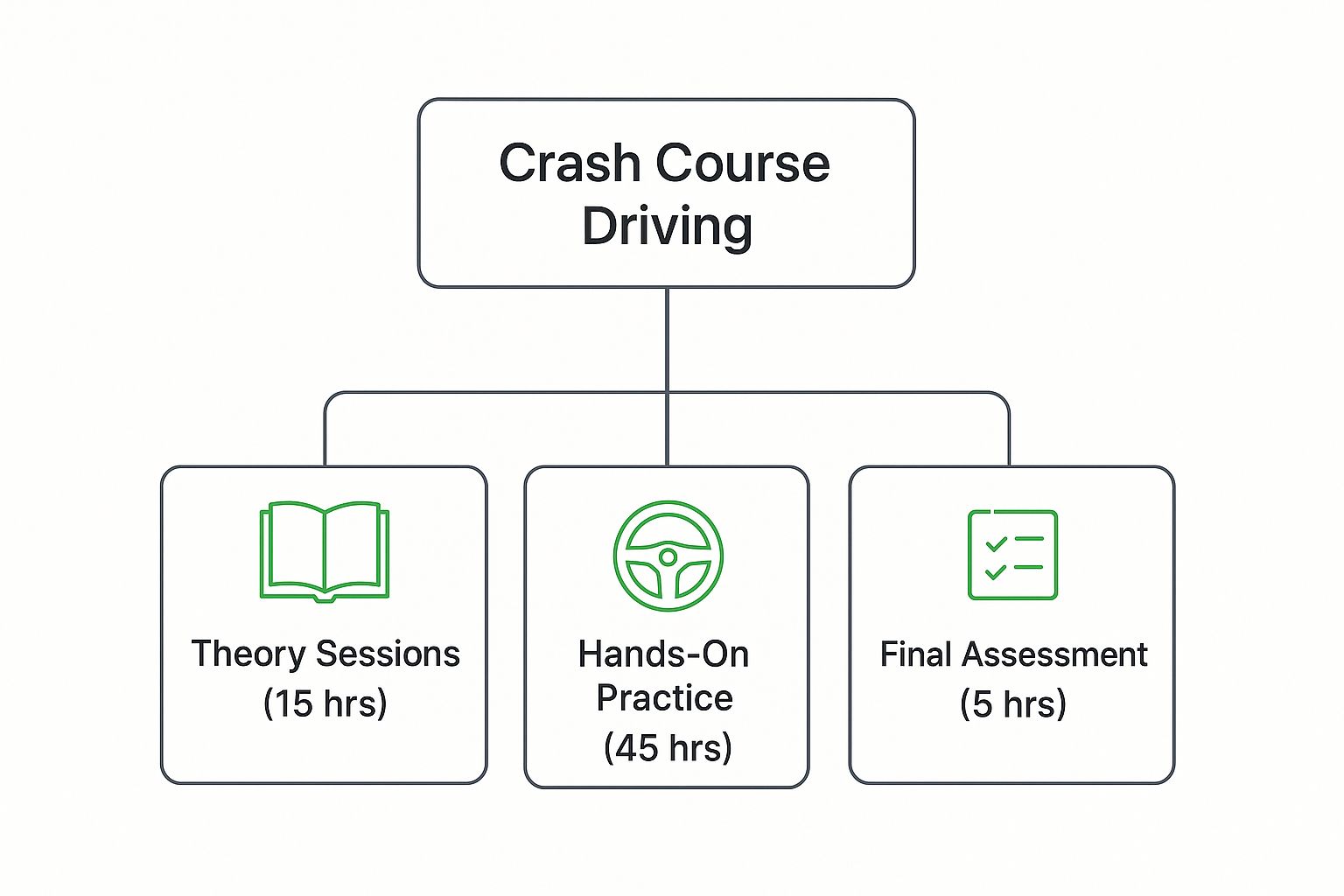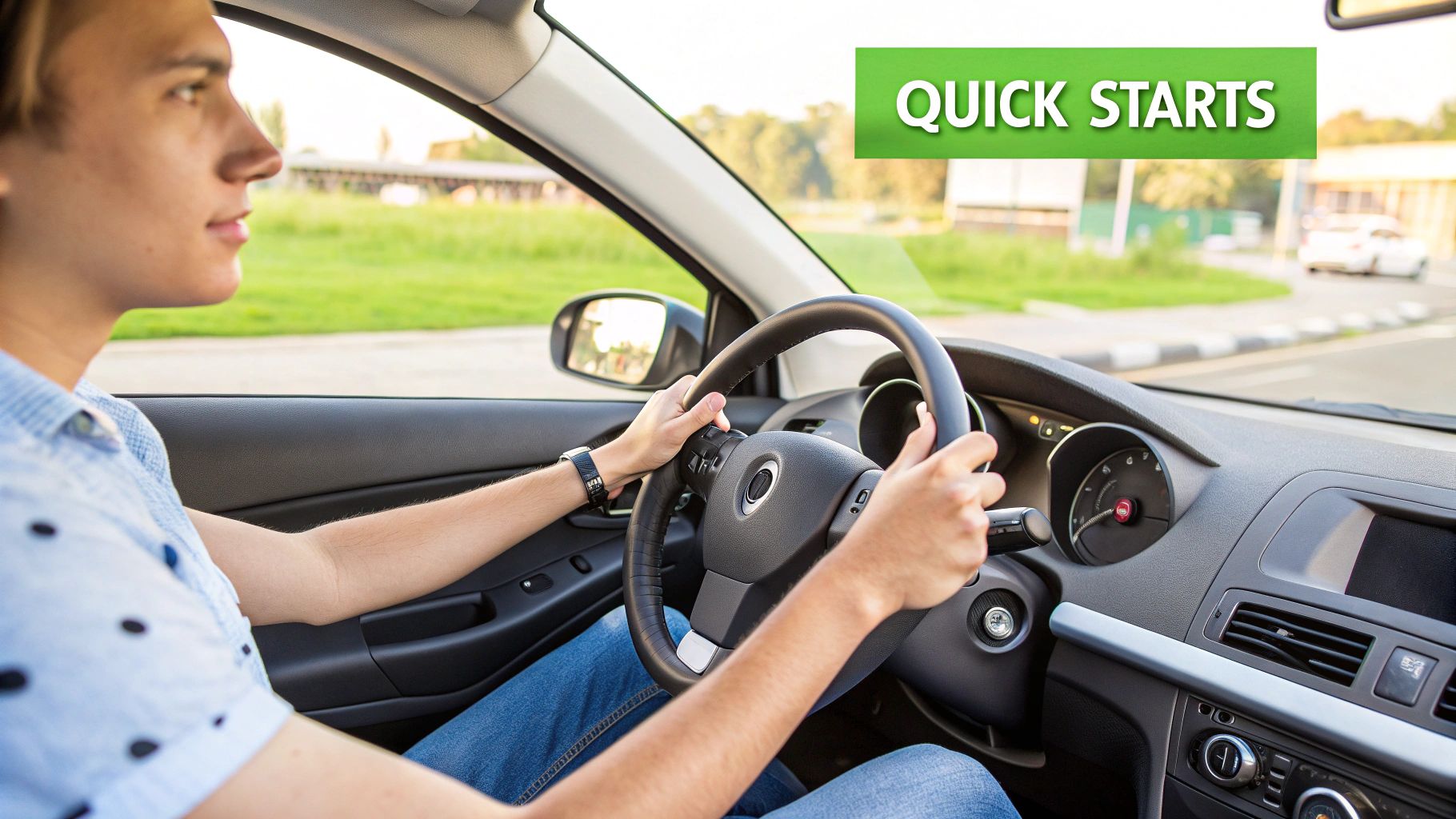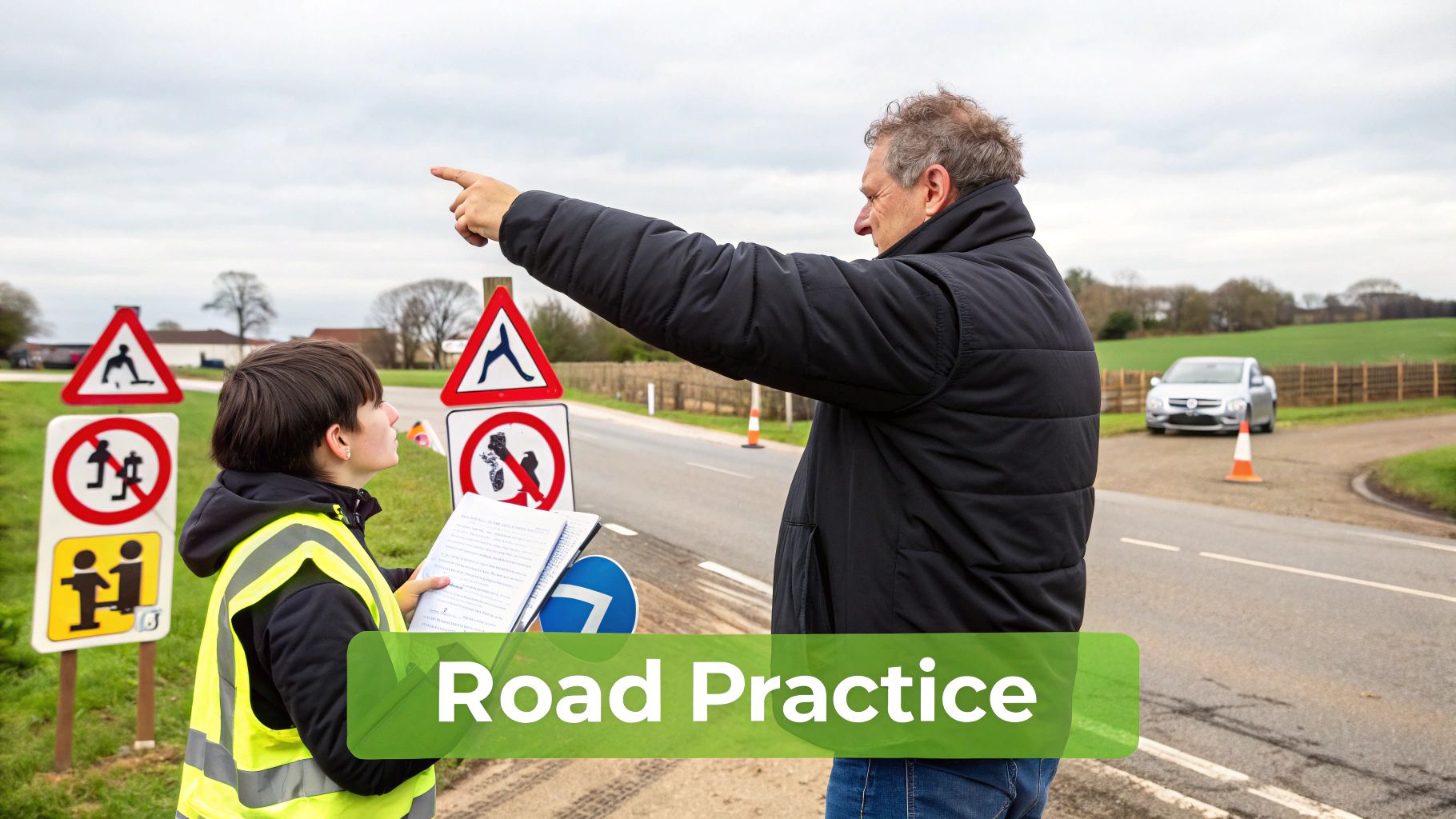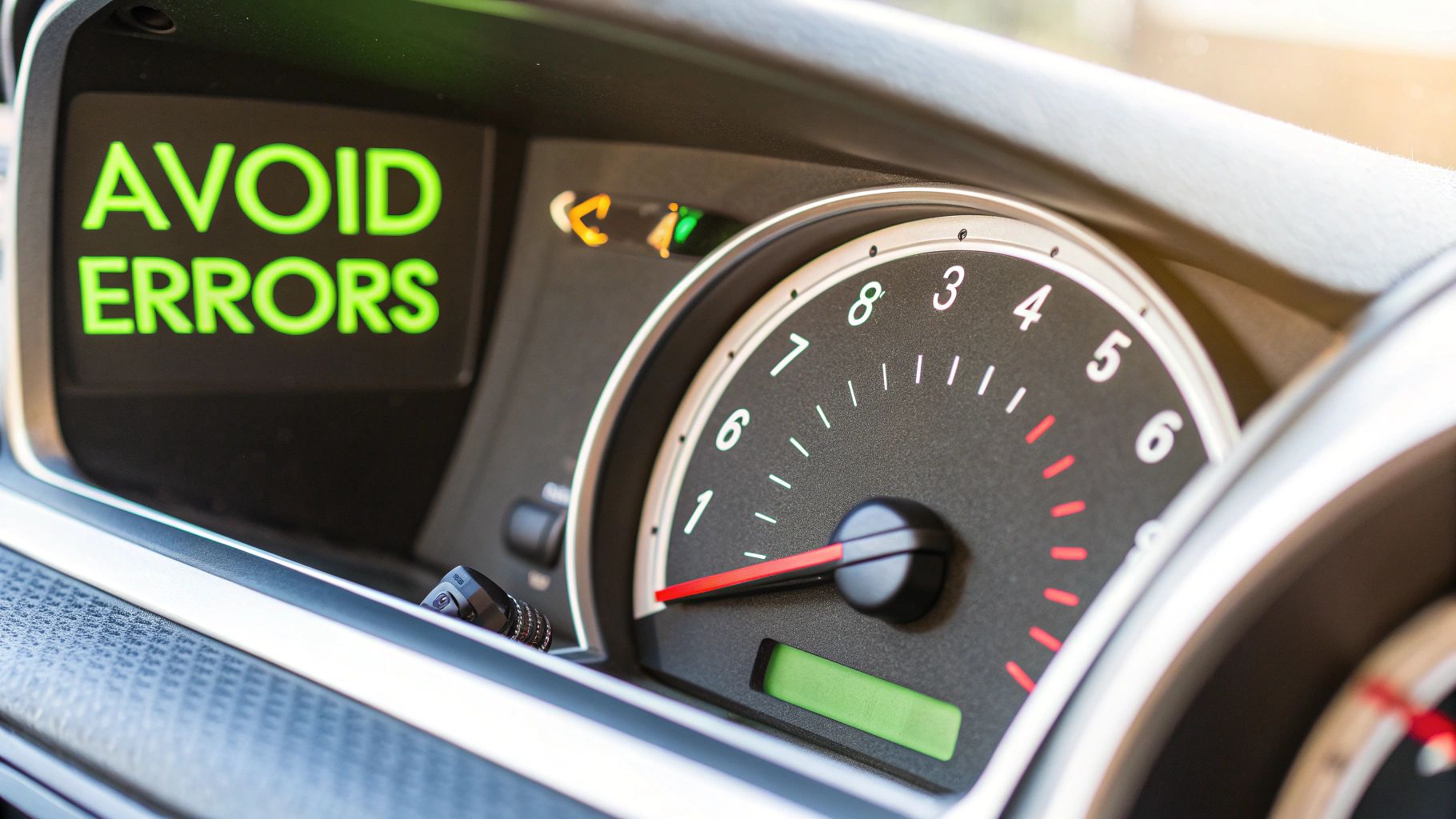So, what exactly is a crash course in driving? Put simply, it’s an intensive training programme that crams everything you need to know to pass your practical test into a much shorter timeframe – think days or weeks, not months. It takes the traditional, spread-out lesson format and condenses it into a highly focused, accelerated schedule.
Unpacking the Crash Course Driving Model
The best way to think about crash course driving is to compare it to a language immersion trip. Instead of learning Spanish for an hour a week (and forgetting most of it by the next lesson), you'd go and live in Spain, speaking it every single day. That’s exactly what a crash course does for your driving. This intense approach quickly builds up your skills and muscle memory, sidestepping the "skill fade" that often happens with long gaps between lessons.
The whole structure is designed with one single goal in mind: getting you ready for your test as efficiently as possible. You won't be taking leisurely Sunday drives. Instead, you'll be spending several hours a day behind the wheel, constantly practising manoeuvres, tackling different road conditions, and getting to grips with what the driving test demands. It’s this sustained, back-to-back practice that helps the learning stick.
To give you a better idea of how it all fits together, here’s a quick comparison of the two approaches.
Crash Course Driving at a Glance
| Feature | Crash Course Driving | Traditional Lessons |
|---|---|---|
| Pace | Intense and fast-paced | Gradual and spread out |
| Duration | Days or a few weeks | Several months or longer |
| Frequency | Daily, for several hours | Usually 1-2 hours per week |
| Learning Curve | Steep, builds momentum quickly | Slower, with gaps between lessons |
| Ideal For | Learners needing a licence fast | Those with less free time or a smaller budget |
As you can see, the main difference lies in the momentum. A crash course is all about building on what you learned yesterday, keeping the progress flowing.
A Typical Course Breakdown
Most reputable courses are carefully structured to cover every part of the official driving syllabus. A well-planned intensive course will balance theory with practical, hands-on driving to make sure you’re fully prepared.
Here's a visual breakdown of how a typical course is structured:

As the infographic shows, the vast majority of your time is spent actually driving, which is the heart and soul of this accelerated learning method.
This model has been a real game-changer, especially in busy cities where people need to get their licence quickly. For instance, pass rates for learners on crash courses in Birmingham often hit between 60% and 70%—a noticeable jump from the national average of around 45-50%.
The secret to a crash course is momentum. When you drive every day, each lesson builds directly on the last. You avoid that frustrating feeling of having to re-learn skills, which means you progress far more quickly than you ever could with weekly lessons.
Ultimately, this isn't just about getting it done fast; it's about making your learning more efficient and seeing continuous, daily improvement.
The Real Benefits of Learning to Drive Fast

The most obvious perk of a crash course driving programme is, of course, the speed. Getting your full UK driving licence in just a few weeks instead of several months can be a massive advantage. It could be the difference between landing a new job, finding your feet after moving to a new area, or just finally ticking it off your list during a short break from university.
But the appeal goes much deeper than just a quick result. The intensive structure directly combats a huge problem with traditional weekly lessons: 'skill fade'. Think about it. With a standard one-hour lesson, the first 15 or 20 minutes are often spent just getting back into the swing of things, trying to remember what you covered last time. Daily lessons cut out that wasted time entirely. Each session picks up right where the last one left off.
This constant, daily practice is brilliant for building muscle memory. You’re not just dabbling in driving; you're completely immersed in it for a short, focused burst of time.
Overcoming Learning Plateaus
Another real benefit is the momentum you build. When lessons are spread far apart, it’s all too easy to hit a wall where you feel like you're not making any real progress. An intensive course is specifically designed to power you through those frustrating sticking points.
An intensive course creates a steep, continuous learning curve. Instead of taking two steps forward and one step back, you are consistently moving forward, which keeps motivation high and focuses your mind on the end goal of passing your test.
Let’s say you’re finding parallel parking a nightmare. On a crash course, your instructor can dedicate a solid chunk of time to just that. You can practise it over and over again until it clicks. That’s a luxury you simply don’t get when you only have five minutes to spare at the end of a weekly lesson. This targeted approach makes sure every skill is up to scratch before you face the examiner.
Is It More Cost-Effective?
While the initial price tag for a crash course might seem higher, it can actually save you money in the long run. The all-in-one package means you avoid the spiralling costs of booking "just one more lesson" week after week.
It really comes down to a few key financial points:
- Fewer Overall Hours: Because you’re not wasting time re-learning old skills, many people find they need fewer total hours of tuition to be ready for their test.
- Predictable Budgeting: You know exactly what you're paying upfront, often including the practical test fee. This makes it much easier to budget without worrying about hidden costs.
- Faster Route to Independence: Having your licence sooner could open up better job prospects or cut down your spending on expensive public transport, giving you a faster return on your investment.
Ultimately, a crash course is an investment in pure efficiency. It bundles speed, focused learning, and clear-cut costs into one package, all designed to get you on the road safely and confidently.
Breaking Down the Costs of a Crash Course
When you first see the price of a crash course driving package, it can feel like a big number. But it's important to look past that initial figure and see what you're actually getting for your money. I always tell my students to think of it less like buying lessons and more like an all-inclusive holiday package for learning to drive.
Most reputable courses roll everything into a single, upfront price. This usually includes all your one-on-one tuition hours, the booking fee for your practical driving test, and sometimes even the theory test revision software. It’s a fixed, predictable investment, which is a huge relief for learners trying to budget without any nasty surprises down the line.
Of course, not every course is the same, and a few key things will affect the final price you pay. Knowing what these are will help you pick a package that's right for you and your wallet.
Key Factors Influencing Cost
The price tag on an intensive driving course can swing quite a bit depending on a few core elements. If you know what to look for, you can find the best value and avoid paying for extras you simply don't need.
- Course Duration: This is the big one. The total number of hours directly shapes the price. A 10-hour refresher for someone who just missed out on passing their test will naturally cost a lot less than a 40-hour course designed for a complete novice.
- Location: Where you learn to drive matters. You can expect to pay a premium in big cities like London or Manchester, where everything from fuel to an instructor's time is more expensive. Lessons in smaller towns or rural areas tend to be a bit cheaper.
- Transmission Type: It often costs a little more per hour for lessons in an automatic car compared to a manual one. This slight difference adds up and will be reflected in the total course price.
- Residential Options: Some schools offer the option to live and breathe your driving course by including accommodation. This adds to the cost, but it's a great choice if you're travelling to an area with shorter test waiting times and want to fully immerse yourself.
The real value of a crash course lies in its financial predictability. You pay a set fee for a complete package, which helps you avoid the open-ended, escalating costs that can come with paying for traditional lessons week after week.
This fixed-cost approach is especially appealing right now. In recent years, the average cost to get a full driving licence has shot up to around £2,100. This painful increase is partly because there's been a 10% drop in registered instructors over the last decade, pushing lesson prices up. You can read more about this trend and how it's affecting families across the UK at youdrivehq.com.
When you invest in a crash course driving package, you're not just buying lessons; you’re buying a structured, efficient plan to get you over the finish line. If you're starting from square one, getting to grips with the options for beginners is the best place to start. You might find our detailed guide on intensive driving courses for beginners useful to see exactly what a full course involves.
Is an Intensive Driving Course Right for You?

A crash course driving programme is a fantastic way to get your licence, but let's be honest—it’s not for everyone. Its fast-paced, high-pressure nature demands a certain type of learner and a specific set of circumstances to really pay off.
Think of it like training for a 10K race. Some people flourish with a structured, intense boot camp over a couple of weeks. Others prefer a slower, steadier jog every few days to build up their stamina over months. There’s no right or wrong way; the best approach is the one that fits you. A crash course is the driving equivalent of that intense training boot camp.
The perfect candidate for an intensive course is someone who can go all-in. You’ll need to clear your calendar for a solid block of time, ready to live and breathe driving for a week or two. If you’re a quick study who enjoys a challenge and performs well under pressure, this environment will feel like a natural fit.
Who Benefits Most From a Crash Course?
So, how do you know if you're cut out for the intensive route? The table below breaks down the key traits of learners who typically excel with this method. Have a look and see how well these points line up with your own situation and personality.
| Ideal Candidate Trait | Why It Matters for a Crash Course |
|---|---|
| You have a clear deadline | Perfect for starting a new job, heading to university, or other time-sensitive goals. |
| You can clear your schedule | Success depends on being able to commit 100% without juggling work or other life demands. |
| You learn practical skills quickly | The pace is relentless, so you need to absorb and apply new techniques almost immediately. |
| You have some prior driving experience | Even a few hours of past lessons can provide a great foundation and boost your confidence. |
| You're motivated by rapid progress | Seeing tangible improvement every single day is a huge part of what makes these courses work. |
If you found yourself nodding along to most of those points, there's a very good chance that an intensive course could be the most effective and efficient path to getting your full driving licence.
When a Slower Pace Might Be Better
On the flip side, this intense approach can be a poor fit for some. If you're a naturally anxious person, the looming pressure of a test just days away could do more harm than good. Likewise, if your schedule is already jam-packed, carving out an entire week of dedicated time might be completely unrealistic.
Someone who has had a little driving experience—even just a handful of hours—often adapts more easily than a total novice. If you’re starting from scratch and feel a bit nervous about getting behind the wheel, traditional weekly lessons can offer a gentler, more gradual learning curve.
Ultimately, the goal is to pass your test and become a safe, confident driver. The best choice is simply the one that gives you the greatest chance of achieving that.
Understanding the Safety Concerns and Downsides
https://www.youtube.com/embed/YTXtL3-MDIk
While a crash course driving programme is an incredibly fast way to get your licence, it's wise to stop and think about the potential downsides and safety questions. The very thing that makes these courses so appealing—their speed—is also what draws the most criticism. The main concern boils down to one simple question: can you really develop genuine road sense when everything is crammed into such a short timeframe?
Critics often point out that passing your driving test and being a truly safe driver aren't necessarily the same thing. Real roadcraft, that gut feeling for what other drivers might do, is something you build over time. It comes from experiencing a whole range of traffic jams, unpredictable weather, and those heart-in-mouth moments that just can't be taught in a textbook. An intensive course is brilliant for drilling manoeuvres and learning test routes, but it's fair to ask if it can substitute for months of varied, real-world experience.
This conversation is especially important given that these courses are a huge hit with younger drivers. In the UK, the statistics are sobering: drivers under 24 are involved in about 20% of road accidents that result in death or serious injury. Some believe the compressed nature of intensive courses might not give learners enough time to build the deep-seated awareness needed for long-term safety, leading to calls for better regulation of these courses.
The Risk of Burnout and Financial Loss
Beyond the safety debate, there are some very real, practical downsides to think about. Learning to drive is mentally tough, and trying to do it all in a week can be completely draining.
- Mental Fatigue: Make no mistake, spending five or six hours a day behind the wheel is exhausting. This can easily lead to burnout, where you’re so tired by the end of the course that you struggle to take in any more information.
- Financial Gamble: The other major drawback is the financial hit you'll take if you fail. With normal lessons, you just book a few more. But if you fail after a crash course, you could be looking at paying for a whole new expensive course and another test, which can quickly erase any savings you thought you were making.
A crash course is designed to get you test-ready in record time. However, becoming a truly skilled driver is a longer journey. Passing your test is just the beginning, not the end of your learning.
To address this, many people who pass after an intensive course make the smart move of getting post-test training. Schemes like Pass Plus are fantastic for building confidence and getting practice on things the standard test doesn't cover, like driving on motorways or at night. It’s a sensible next step that helps turn someone who can pass a test into someone who is a safe and confident driver for life.
How to Choose the Right Driving School

Let’s be honest, picking where to put your money for a crash course driving programme is a huge deal. It’s probably the most important decision you’ll make on this journey. A fantastic school will pave the way for a first-time pass, but a poor one can easily lead to a failed test, dented confidence, and wasted cash.
The absolute first thing you need to check is the quality of the instructors. This is non-negotiable.
Make sure the school only uses DVSA-approved driving instructors (ADIs). An ADI isn't just someone who's good at driving; they've been through rigorous exams to prove their driving skill, their ability to teach, and their in-depth knowledge of road theory. This is your guarantee of getting professional, high-calibre tuition that meets the UK's national standards.
Vetting the School's Reputation
Once you've ticked the ADI box, it's time to do a bit of detective work into the school's track record. Don't just fall for the glowing testimonials plastered on their homepage. You need the real story. Head over to independent sites like Google or Trustpilot to see unfiltered reviews from other learners.
Keep an eye out for what people are really saying about:
- Communication: How easy was it to get hold of someone? Were their questions answered promptly?
- Vehicle Quality: Were the cars modern, clean, and properly maintained? You'll be spending a lot of time in it, after all.
- Instructor Professionalism: Were the instructors on time, patient, and genuinely supportive?
Another good sign is transparency about pass rates. While no school can promise you'll pass, one that's open about its success statistics is clearly confident in the training it provides.
A great driving school won’t just teach you to pass a test; they will build your confidence and equip you with the skills for a lifetime of safe driving. Their policies on everything from test booking to failures should be clear and upfront.
Key Questions to Ask Before You Book
Before you hand over any money, pick up the phone and ask some direct questions. The way they respond will reveal a lot about their customer service and how they operate. You can learn more about what a well-organised programme looks like by reading our guide to help you unleash your potential with our crash course.
Here are a few must-ask questions:
- How do you book my practical test, and how do you find an early test date?
- What happens if I fail my test? What’s your policy?
- What kind of car will I be learning in (model and transmission type)?
Got Questions About Crash Courses? We've Got Answers
So, you’re thinking a crash course is the right move for you. That's great! But it's completely normal to have a few questions buzzing around before you take the plunge. Let's tackle some of the most common ones we hear from learner drivers.
Do I Need to Pass My Theory Test First?
Yes, you absolutely do. Any driving school worth its salt will insist you have your theory test pass certificate in hand before you can book an intensive course.
This isn't just a bit of admin. There’s a solid reason for it: your driving school needs your pass number to book your practical test, which they'll line up for the end of your course. Plus, having it sorted means you already understand the rules of the road and hazard perception. This lets you dedicate all your focus to the hands-on driving when your intensive week kicks off.
A quick word of warning: be very cautious of any school that promises you'll pass. A top-notch course gives you a massive advantage with focused, expert tuition to get you test-ready fast. But on the day, it all comes down to how you perform.
What Happens If I Don't Pass My Driving Test?
Failing your test is a real gut-punch, but it's not the end of your driving journey. A good driving school will have a clear plan ready for just this situation.
Most will offer extra "top-up" lessons, which you can pay for by the hour, to work specifically on the weak spots your examiner pointed out. Some even have "re-test" packages that bundle together a few hours of corrective training with a new test booking. It's really important to ask about their policy on this before you pay for anything, just so you don't face any unexpected costs later.
Is a Pass Guaranteed?
In a word: no. This is a big one. A "guaranteed pass" is a huge red flag and usually a sign you're dealing with a dodgy company. Nobody can guarantee you'll pass the UK driving test.
Think of a crash course driving programme as intensive coaching, not a magic ticket. It's designed to give you the very best shot at passing by immersing you in professional, concentrated instruction. It gets you to the required standard far more quickly than weekly lessons, but your ability to drive safely and confidently on the day is what earns you that pass certificate.
Ready to get on the road fast? At Fast Pass Driving Courses, we offer structured, intensive programmes with DVSA-approved instructors to get you test-ready in weeks, not months. Find the perfect course for you.

